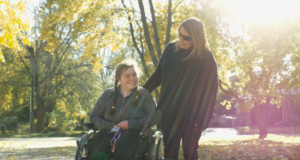Don’t Miss Out on these Discoveries During IEP or Parent Meetings
by Beth
I am delighted to have Patty O’Machel back with us as a guest blogger. Patty is a writer, special needs advocate and mom. Last year Patty launched a business called Educating Outside the Lines, a disability awareness project that stems from her core belief that “kids with disabilities are just kids.”
by Patty O’Machel

Patty (right) and her daughter (left)
It’s that time of year, when the days of swimming and sleeping in rapidly turn to school supplies and meeting new teachers. For my typical kids, this looks one way and has its own fears and uncertainties and anticipation. But for my daughter with a disability, and for me as her parent, it has a very unique set of stresses.
We are not only meeting her new teacher or teachers, but also a host of ancillary people who all have an investment in her school day: aides, resource teachers, physical therapists (PTs), occupational therapists (OTs), and technology professionals. Every year we are faced with not just one new teacher, guiding her day, but a host of disciplines and professionals whose jobs intersect and complement one another for my daughter’s overall success. There is a team to work with her, in and out of her classes and life all day, every day.
As a parent, this whole coordinated dance can be incredibly overwhelming. We head it off by starting the year before, arranging meetings and planning sessions, but it still can feel like you, as your child’s head CEO, are conducting an orchestra when you can’t even read music.
I think back to being a newbie parent, when I sat at my kitchen table with all of the Early Intervention professionals around me, worrying about whether they liked the muffins I set out while also trying to focus on every word and acronym they said about my daughter — I felt like I had been dropped into a new country and didn’t know the language. I remember clearly feeling my heart break a little more each time, as they went around the table talking first about all of her strengths…and then about each of her weaknesses.
I, like all special need’s parents, know this drill. You can’t actively listen to the strengths when you know the other shoe is going to drop, and the weaknesses are coming at you. The gap between my daughter’s strengths and weaknesses grows wider every year. By the time we got to 8th grade, I asked if we could just start with the weaknesses first, and then talk about the areas of growth.
I am not a teacher, an educator, a physical therapist, or a reading specialist. My education and background professionally did not prepare me for this role, but I still do it, and I think I do it really well. I may not have a degree in special education, but in many ways, I consider myself an expert!
So with that expertise in mind, I propose a new way of doing parent meetings and IEP’s. Let’s start with the negatives, and then spend the rest of the meeting talking about areas of strength in my child and how we are going to foster those super powers and stoke the flames so he or she can be successful.
I recently met a young man with dyslexia who was reading with the second graders when he was in fifth grade. It wasn’t until a special teacher saw the magnitude of things he “could” do, and began to foster those unique strengths, that he began to be seen as the brilliant young man he is, gifted in robotics. For too long he had been seen only for his weaknesses. Focusing on his host of talents and super powers gave him the tools he needed to succeed in his unique way. He has just started his first year at a prestigious university with a full-ride scholarship, based on his strengths, not on his disability.
It took a teacher to look at this young man’s path to success differently, as unique as he was, and foster that flame. It took what is a rare approach in education, looking at all a child can do and not just what they cannot do. I know that educators, administration, and ancillary professionals are more stressed and busy in our schools than they have ever been. Trying to teach a classroom of 20-plus students and still see the unique light in each of them is an almost impossible task, but the students with the unique superpowers are often the ones who go unnoticed. It is difficult to differentiate a child who cannot keep pace with the pack and needs their own individual route to the same destination, yet each of our kids, disability or not, deserve to find that path. All kids should get the same shot at success in their own ways.
My dream for this school year is that teachers will start to look for the cape, the superpower, the hidden spark in kids who, from the outside, look incapable. That they will be willing to take the road less traveled with our kids and truly see how their unique path can lead to success.






